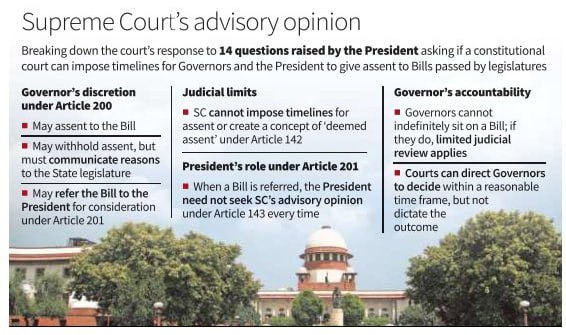PREVIOUS
16th Presidential Reference 2025
November 23 , 2025
99 days
580
0
- A five-judge Bench of the Supreme Court, headed by CJI BR Gavai on 20th November 2025, answered the 16th Presidential Reference under Article 143.
- None of the five judges claimed authorship of the 111-page opinion, fashioning it as the ‘Opinion of the Court’.
- The Supreme Court’s opinion in its answer to the Presidential Reference “will have no impact on the April 8, 2025 judgment in the case of State of Tamil Nadu v. Governor of Tamil Nadu.”
- A nine-judge Bench in Ahmedabad St. Xavier’s College Society v. State of Gujarat (1974) said “advisory opinion of the Court would have no more effect than the opinion of the law officers.
- The Supreme Court Bench tendering the advisory opinion “has reaffirmed” that the elected “government should be in the driver’s seat, and there cannot be two executive power centres in the State”.
- The opinion has also reaffirmed that the Governor cannot “indefinitely delay” acting on Bills
- In cases of prolonged, unexplained, and indefinite delay by the Governor in considering a Bill, States can approach the Constitutional Courts and hold Governors accountable for their deliberate inactions.
- The Supreme Court’s opinion has again rejected the Tamil Nadu Governor’s (a) theory of pocket veto, (b) assertion that Bills can be killed or buried by the Raj Bhavan.
- The SC has also empowered Constitutional courts to review their actions if they obstruct the passage of Bills indefinitely.
- And they cannot hide behind Article 361.
- The Bench also stated that limited judicial review is permissible in cases of prolonged inaction
- The Supreme Court clarified that governors and President are not bound by judicially prescribed timelines in the discharge of functions.
- Imposing timelines on the President and Governors to deal with all Bills pending with them for assent through judicial orders would be akin to taking a “one-size-fits-all” approach.
- It was especially in the absence of any constitutionally prescribed schedule or manner of exercise of powers by Governors or the President under Articles 200 and 201.
- The Reference Bench said the President need not consult the Supreme Court on every State Bill referred to her by Governors for consideration.
- It would be left to the discretion of the President to take the advice of the Supreme Court under Article 143.
- The Bench clarified that the courts had no power to review the merits of Bills.
- The usurpation of the gubernatorial function of the Governor, and similarly of the President’s functions, is antithetical not only to the spirit of the Constitution, but also specifically, the doctrine of separation of powers
- The separation of powers is a part of the basic structure of the Constitution.
- It opines concept of ‘deemed assent’ is alien to the Constitution.
- At the same time, the court also clarified that the President and Governors cannot resort to prolonged and evasive inaction, by sitting endlessly on State Bills awaiting their approval.
- It clarified that a Governor has actually three options before him under Article 200:
- To grant assent to the Bill
- Reserve it for the consideration of the President
- Withhold assent and return the Bill to the State legislature with comments if it is not a Money Bill.
- A Governor cannot stall a Bill without returning it to the State Assembly along with his reasons for doing so.
- The court opined that a Governor was not bound by the aid and advice of the Council of Ministers while exercising his function under Article 200.
Article 143
- It empowers the President of India to seek the SC’s advisory opinion on any question of law or fact that is of public importance and is likely to arise or has already arisen.
- This provision establishes the SC’s advisory jurisdiction, which is exclusive to the President.
- But the Clause 2 of this Article allows the President to refer disputes from pre-Constitution treaties, agreements, sanads, etc.
- The above was excluded under Article 131 so the Court must opine.
- Article 131 empowers the Supreme Court to adjudicate Centre–State or inter-State disputes.

Leave a Reply
Your Comment is awaiting moderation.


